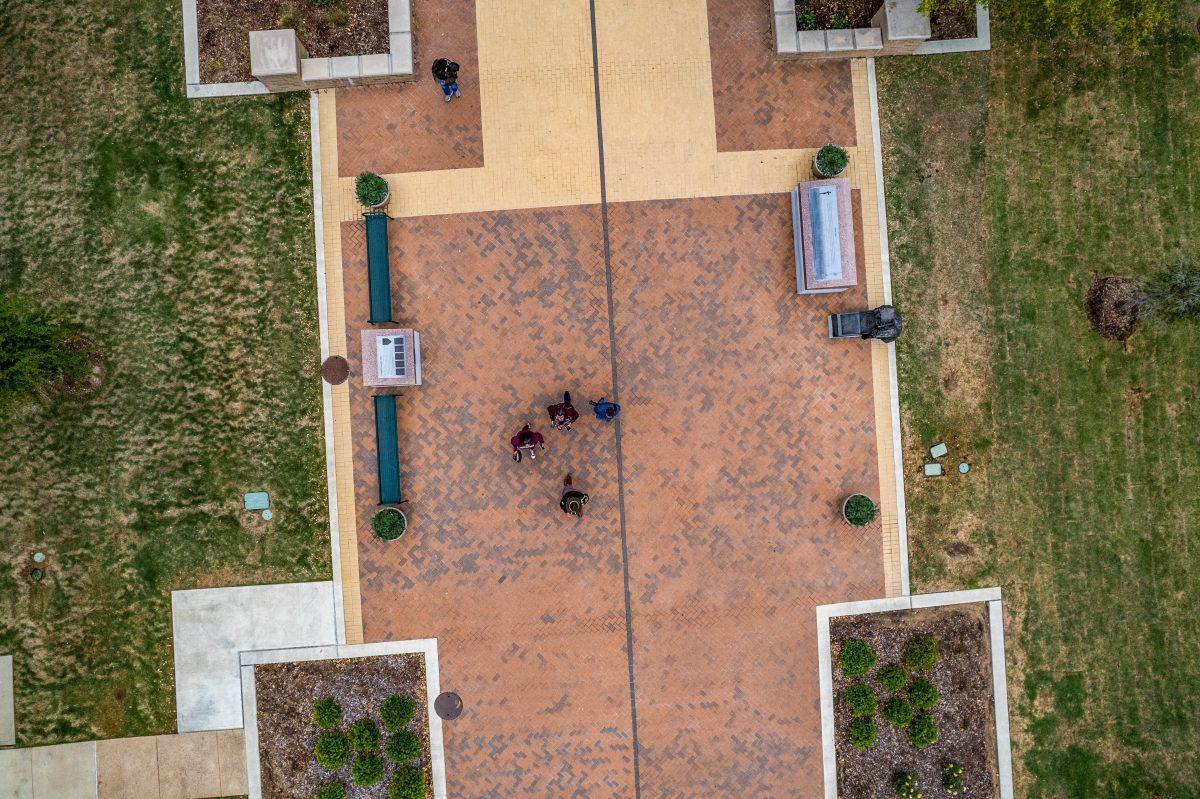Texas A&M released its findings after reviewing former-President M. Katherine Banks’ the Path Forward initiative in a 32-page report published online on Sept. 19. The findings recommend less centralization throughout the university, increased resources for colleges and a push to re-establish trust in the journalism program.
On Aug. 18, Interim President Mark Welsh announced he appointed Vice President for Planning, Assessment and Strategy Joe Pettibon to assess the initiative and provide a comprehensive report of the observations and recommendations.
In a Sept. 15 statement, Welsh said the team conducted over 100 listening sessions with key university stakeholders, such as on-campus faculty groups including the Council of Deans, executive committees in the Faculty Senate, distinguished professors and more. Welsh said these meetings also included student leaders.
General observations from the report emphasized there must be stronger shared governance among faculty and administrators in the future, marking a change from the centralization initiative the Path Forward proposed.
Banks’ Path Forward initiative was based on a report from a third-party company, MGT Consulting, from 2021. The report similarly included a list of observations and recommendations, many of which were implemented.
Despite skepticism about MGT’s findings, the report said the university should continue many of its initiatives.
“Concerns have been expressed about the origins of the MGT report and the value of its recommendations,” the report reads. “Nevertheless, changes have been implemented and the university is in a different place than even one year ago. Any steps taken in a different direction must build on where we are today, not where we were.”
According to the new report, the university must rely less on top-down solutions, especially on smaller details, such as department and degree names, program proposals and the structure of academic units and programs.
Faculty affairs, university libraries
The Path Forward restructured the Provost Office, resulting in college deans being significantly less involved in major university decisions, which was not received well across campus, the report reads.
“There is a significant concern that the power and authority for faculty resources, at the heart of every college and school’s concern, is outside the control of the provost,” the report reads.
Many offices are also not resourced adequately and run inefficiently, such as the faculty affairs staff being separated into two buildings, according to the report. Additionally, the dissolution of the Academic Innovation Office and moving the Aggie Honor System Office under Student Affairs caused concern among faculty, who worried the systems would be weakened permanently.
In response, the report recommends reverting the changes by elevating the provost back to the No. 2 position in the university and returning power to the provost to better function specific offices, such as the Aggie Honor System Office and the Education Abroad Office.
The elimination of faculty tenure for librarians was the most divisive and concerning element of the Path Forward changes, according to the report.
“Significant questions were raised about the treatment of colleagues being forced to choose between remaining in the Libraries in a staff position or retaining tenure as a faculty member outside the Libraries,” the report reads. “An estimated 25% of these faculty members left rather than make this choice.”
However, the report recommends there be no change to librarian faculty status or tenure at this time, instead recommending A&M codify academic freedom for librarians in a system policy or university rule.
Out with the old, in with the new … and out with the new?
As a result of the Path Forward, three colleges — the colleges of geosciences, science and liberal arts — were combined to create the College of Arts and Sciences. The new college is comparable with the College of Engineering in terms of enrollment and budget, according to the report.
“The rationale for this merger was not and still has not been clearly articulated, leaving [the] leadership of the new college to develop the rationale from any benefits realized,” the report reads.
The report identified two major concerns within the new college: firstly, tenure and promotion policies alongside research expectations. Second, budget appropriation, as sharing a budget would result in less funding for costly science disciplines, according to the report.
Additionally, the report said it’s unclear why the university studies program was eliminated so quickly, especially with no substitute in place yet.
The recommendations were to retain the merged college and review its governance to ensure no faculty or major is treated unfairly.
The creation of the School of Performance, Visualization and Fine Arts was also welcomed among students and faculty, the report reads. While those involved are confident in the school’s future, the college needs more resources, as over its first seven years, it’s predicted to have a $60 million revenue shortfall.
“Absent a feasible plan, it may be necessary to merge with another college or school,” the report reads.
Following negative press regarding the re-establishment of A&M’s journalism program, the report recommends the department continue and focus on rebuilding trust to attract students and faculty.
The former president pushed for the creation of a life sciences meta-major. Similar to the College of Engineering’s entry-to-a-major system, it would have required life science majors to spend their first year in a “meta-major” and apply for their preferred major after their first year at A&M. The report recommends ending the pursuit of this effort altogether, as there was no evidence showing it had support from the majority of faculty and no evidence had been presented showing it would benefit students.
Health programs being moved to the School of Public Health and political science and international studies programs to the Bush School of Government and Public Service were received well by faculty and students, according to the report, and no large changes were recommended.
For the McAllen Higher Education Center, the report noted further investment was needed to bring the faculty to a sustainable level, and for the Galveston campus, plans to relocate faculty to Galveston are opposed by staff, according to the report. Faculty also oppose a plan to sell a major building, fearing it will disrupt research and equipment.
The integration of the Counseling and Psychological Services, or CAPS, and the Student Health Services with the Health Science Center was discussed, with the report noting the initiative is reaching more students.
However, the report notes the separation of CAPS and the Division of Student Affairs is a cause for concern, as it may cause a deterioration of services.
Centralization, centralization, centralization
The report also offers observations regarding the centralization of facilities, finance, HR, IT and marketing and communications.
“The centralization of these five areas was not well coordinated and the operational structures differ significantly, making coordination across the centralized areas more difficult to navigate,” the report reads. “The implementation plan shifted personnel, then budget, followed by trying to define roles and responsibilities. The reverse approach should have been followed, which would have limited issues.”
Centralization resulted in a plethora of issues according to deans and department heads cited in the report, such as departmental needs being overlooked, cross-functioning with other teams becoming more difficult, additional layers of bureaucracy, decreased accountability and increased workload among faculty in contrast to the less workload originally promised.
“There have been some suggestions that the centralization efforts have resulted in [$8 million] in savings, but the university community is highly skeptical of this assertion given their own experience at the unit level,” the report reads. “In addition, additional resources have been invested in all five centralized areas to varying degrees, resulting in more positions and increased budgets for these functions.”
For facilities in particular, the report noted centralization caused long delays in multiple areas that affect teaching and research. In the School of Veterinary Medicine, the freezer broke, resulting in all specimens melting. The air conditioning has been broken in animal science buildings for nine months, a window has been damaged at the Bush school for 10 months, elevators are failing to operate in the Dwight Look Civil Engineering Building and more, according to the report.
Finally, the report noted capital construction projects throughout the university were also affected by centralization.
“There does not appear to be a current strategy with stakeholder input on priorities that engages anyone outside select members of leadership,” the report reads.
In a statement that accompanied the report, Welsh asked for feedback from the community on the report and its recommendations.
“Your perspectives and suggestions will play a pivotal role in shaping my final decisions,” Welsh said in the statement.
Community feedback can be shared in an online form found on the Office of the President’s website, and the form closes Tuesday, Sept. 26 at 5 p.m.
“I will review all your feedback to inform my decisions on [the] next steps, which will be shared on Oct. 4 at an all-faculty, staff and student meeting,” Welsh said.
University releases findings on the ‘Path Forward’ initiative
September 20, 2023
Photo by Samuel Falade
0
Donate to The Battalion
$2165
$5000
Contributed
Our Goal
Your donation will support the student journalists of Texas A&M University - College Station. Your contribution will allow us to purchase equipment and cover our annual website hosting costs, in addition to paying freelance staffers for their work, travel costs for coverage and more!
More to Discover










